
Case Report
Gastrointest Cancer Res Ther. 2016; 1(1): 1004.
Minimally Invasive Retrieval of a Migrated Duodenal Stent
Edwards SB¹, Steele J², Iskandar M², Wayne M² and Cooperman AM²*
¹Department of Surgery, Mount Sinai Beth Israel, USA
²Division of Surgical Oncology, Mount Sinai Beth Israel, USA
*Corresponding author: Avram M Cooperman, Division of Surgical Oncology, The Pancreas & Biliary Center at Mount Sinai-Beth Israel Medical Center, 10 Union Square East (2M), New York, New York 10003, USA
Received: June 17, 2016; Accepted: July 01, 2016; Published: July 04, 2016
Abstract
Background: Self-expanding metal and covered metal stents (SEMS) commonly relieve malignant gastric outlet obstruction. In benign disease their use is limited. While disease progression and tumor ingrowth limit migration of duodenal stents in malignancy, stents placed for benign disease are more likely to migrate. When needed, laparotomy has been used to retrieve migrated stents. We summarize a case and the rationale for laparoscopic stent retrieval.
Methods: A 62 year old female had a coated metal duodenal stent placed endoscopically after failure of medical management for a duodenal stricture secondary to peptic ulcer disease. This stent migrated and impacted in the mid jejunum and could not be retrieved endoscopically. Laparoscopic retrieval was successful and without complication
Results: Oral intake was resumed on postoperative day 4. No intraoperative or postoperative complications occurred.
Conclusions: Laparoscopic retrieval of a migrated duodenal stent is a safe and feasible approach, and should be considered when migrated, symptomatic stents are beyond the reach of endoscopes and warrant retrieval.
Keywords: Small bowel obstruction; Gastric outlet obstruction; Duodenal stent; Self-expanding metal stents; SEMS; Stent migration; Bowel perforation
Abbreviations
SEMS: Self-expanding metal stent; GERD: Gastroesophageal Reflux Disease; GOO: Gastric Outlet Obstruction
Introduction
Self-expanding metal and covered metal stents (SEMS) are used to relieve malignant gastric outlet obstruction. Their use in benign disease is limited. The incidence of stent migration in benign disease ranges from two to fifty plus percent [1,2]. While most migrated stents pass spontaneously or are retrieved endoscopically, four to seven percent require surgical removal. We report a case of laparoscopic stent retrieval and advocate that a minimally invasive approach be considered for migrated stents causing small bowel obstruction.
Case Presentation
A 62 year old female with a history of hypertension, diabetes and Gastroesophageal Reflux Disease (GERD) presented to the emergency department five weeks after hysterectomy with intractable nausea and vomiting. Upper endoscopy showed gastric outlet obstruction (GOO) secondary to duodenal ulceration and was treated with a proton-pump inhibitor (Image 1). Endoscopic evaluation 1 month later showed a stricture of the duodenum and a 22mmx10cm coated metal stent was deployed (Image 2). She was discharged on a puree diet and proton-pump inhibitor with planned stent removal in 6-8 weeks.
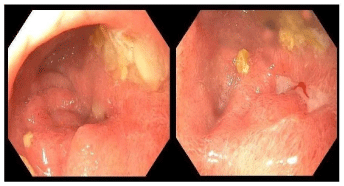
Image 1: Upper endoscopy revealing ulceration and obstruction of proximal
duodenum.
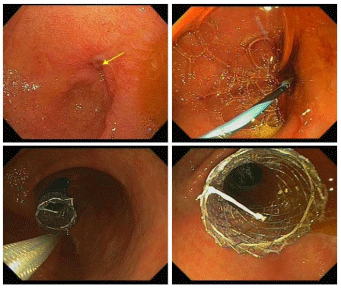
Image 2: Covered duodenal stent placement on endoscopy performed
one month after conservative management of peptic ulcer disease of the
duodenum.
One month after stent placement, she noted vague abdominal discomfort. An abdominal X-ray showed migration of the stent to the left upper quadrant (Image 3). Endoscopic retrieval failed. Over the next month her pain increased. A CT of the abdomen revealed an impacted stent in the distal jejunum, thickening of the bowel wall and surrounding inflammatory changes (Image 4). Concern for stent impaction and perforation were discussed.
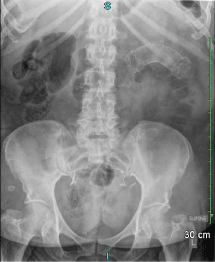
Image 3: Abdominal plain film showing migrated stent.
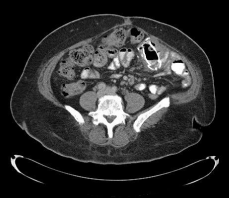
Image 4: CT scan showing impacted stent with surrounding inflammation.
Prior to surgery, the patient underwent nasogastric decompression. Risks, benefits and alternatives to surgery were reviewed and informed consent was obtained. At surgery she was placed supine and after induction of general anesthesia, a foley catheter was placed.
A pneumoperitoneum of 15mmHg was obtained through a Veress needle, which was replaced with a 5mm port. Laparoscopy revealed infra-umbilical adhesions. A 12mm port was placed in the right mid-abdomen and two 5mm ports were placed right of the midclavicular line, eight centimeters apart (Figure 1). Omental adhesions were lysed, beneath which an inflamed, thickened loop of small bowel, that was adherent to the umbilicus, was seen and freed. The stent was felt in this loop of bowel and a healed anastomosis was seen distal to the impaction. An enterotomy was made with a Harmonic scalpel and the stent was exposed, grasped, collapsed and removed. The enterotomy was closed with sutures and patched with omentum. The specimen was then removed in a specimen bag (Endo Catch Gold Device; Covidien, USA) through a separate incision. No intraoperative complications occurred during the 163 minute procedure.
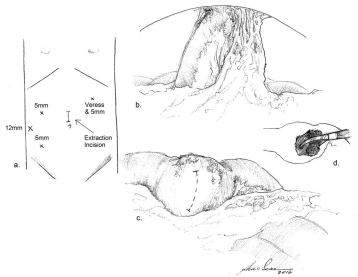
Figure 1: a. Port placement b. Bowel and omental adhesions to the umbilicus
c. Affected small bowel segment and enterotomy d. Stent extracted with
Maryland forceps.
Results
A full liquid diet was taken on postoperative day 4 and a soft diet at discharge 3 days later. No complications were observed.
This research followed the principles and standards of the Declaration of Helsinki of 1975, last revised in Seuol in 2008. Care and reporting of this case adhere to principles of confidentiality and patient autonomy.
Discussion
For patients with advanced malignant gastric outlet obstruction, duodenal stenting is a reasonable alternative to surgery. It eliminates operative risk, shortens hospital stay and allows oral intake [1,2]. Depending on extent of metastatic disease, frequency of stent obstruction and anticipated survival, patients can be managed by stenting or laparoscopic bypass. Because of tumor ingrowth or food impaction these stents obstruct frequently but migrate infrequently, with rates between 1-5%. In benign disease, stents migrate in up to 50% of cases with require removal in 4-7%, usually via an endoscope. Issues of stent patency and bowel complications secondary to migration, limit long term use in benign disease. Endoscopy is the first method of stent retrieval, particularly when the stent is in the stomach or proximal small bowel [1-4].
Complications of endoscopically placed stents include occlusion and stenosis, mucosal erosion with bleeding, fracture of the stent, stent migration, and migration with obstruction or perforation [5- 9]. While bare metal stents are often used in malignancy, they are susceptible to tumor ingrowth and occlusion. Covered stents are more often used in benign disease, for the short term. They are easier to remove than uncovered stents but are more likely to migrate [9]. In our patient strong consideration was given to a gastrojeunostomy at the time of laparoscopic stent removal but the patient and referring physician thought it unnecessary.
The incidence of stent migration is variable ranging from 1% to more than fifty percent [6,7,9-11] depending on the indication (benign, malignant) and the stent (uncovered, covered). In a study comparing covered and bare metal SEMS, migration occurred in half of covered stents placed for benign disease [9,12]. Higher migration rates in benign disease are reported [12]. Migration may be retrograde, into the stomach, causing early satiety, bloating, postprandial pain or nausea, and are usually retrieved by EGD. Stents beyond the endoscope, may be retrieved surgically if they do not pass enterically [5].
Distal stent migration, while frequently asymptomatic, may obstruct, perforate, or cause bleeding [8,9,13,14]. Prior bowel surgery as in this case, with adhesions, bowel kinking, or narrowing, may cause stent impaction. Close monitoring of patients with migrated stents is necessary and if spontaneous passage unlikely, removal is advised. We and others advocate for a laparoscopic approach to benign and malignant disease and for stent retrieval, when possible, because of shorter hospitalization, less pain, and shorter recovery [1,2,15].
Laparoscopic surgery is preferred for palliative gastrojejunostomy in malignant obstruction. Several studies document shorter hospital stays, earlier return of bowel function, and less blood loss with laparoscopy [1-3,15-17]. Selection of patients must be individualized to determine whether endostents, palliative or definitive surgery should be done. The cause of obstruction, extent of disease and anticipated survival, factor in this decision [10,16]. In benign GOO, laparoscopy has wide application for some complications, particularly obstruction and perforation, Obstruction may be caused acutely by edema, but more often results from chronic inflammation, scarring and stenosis
While most stents pass spontaneously, when a stent lodges in the bowel, removal is necessary, hopefully before perforation [8,11,13]. Given the flexible nature of SEMS a small enterotomy facilitates retrieval. Open laparotomy should be reserved for those who laparoscopy is not technically or otherwise feasible.
Clearly others have used but not cited laparoscopic retrieval of migrated stents. This approach should be considered in all cases where surgery is a consideration.
Conclusion
Endoscopic stents to treat benign ulcer disease have a high rate of stent migration and should be used selectively. A laparoscopic approach and retrieval should be a first consideration when surgery is needed.
References
- Hosono S, Ohtani H, Arimoto Y, Kanamiya Y. Endoscopic stenting versus surgical gastroenterostomy for palliation of malignant gastroduodenal obstruction: a meta-analysis. Journal of Gastroenterology. 2007; 42: 283– 290.
- Zheng B, Wang X, Ma B, Tian J, Jiang L, Yang K. Endoscopic stenting versus gastrojejunostomy for palliation of malignant gastric outlet obstruction. Dig Endosc. 2012; 24: 71-78.
- Gentileschi P, Kini S, Gagner M. Palliative laparoscopic hepatico- and gastrojejunostomy for advanced pancreatic cancer. JSLS. 2002; 6: 331-338.
- Moura, EGH, Ferreira FC, Cheng S, et al. Duodenal Stenting for Malignant Gastric Outlet Obstruction: Prospective Study. World Journal of Gastroentereology. 2012; 18: 938-943.
- Ko HK, Song HY, Shin JH, Lee GH, Jung HY, Park SI. Fate of migrated esophageal and gastroduodenal stents: experience in 70 patients. J Vasc Interv Radiol. 2007; 18: 725-732.
- Graber I, Dumas R, Filoche B, Boyer J, Coumaros D, Lamouliatte H, et al. The efficacy and safety of duodenal stenting: a prospective multicenter study. Endoscopy. 2007; 39: 784-787.
- vanHooft JE, Uitdehaag MJ, Bruno MJ, et al. Efficacy and safety of the new WallFlex enteral stent in palliative treatment of malignant gastric outlet obstruction (DUOFLEX study): a prospective multicenter study. Gastrointestinal Endoscopy. 2009; 69: 1059-1066.
- Moxey PW, Khan AZ, Karanjia ND. A case of small-bowel perforation caused by a migrated duodenal stent. Endoscopy. 2007; 39 Suppl 1: E54.
- Waidmann O, Trojan J, Friedrich-Rust M, Sarrazin C, Bechstein WO, Ulrich F, et al. SEMS vs cSEMS in duodenal and small bowel obstruction: high risk of migration in the covered stent group. World J Gastroenterol. 2013; 19: 6199-6206.
- Ahn HS, Hong SJ, Moon JH, Ko BM, Choi HJ, Han JP, et al. Uncovered self-expandable metallic stent placement as a first-line palliative therapy in unresectable malignant duodenal obstruction. J Dig Dis. 2012; 13: 628-633.
- Phillips M, Gosain S, Bonatti H, et al. Enteral Stents for Malignancy: A Report of 46 Consecutive Cases Over 10 Years, with Critical Review of Complications. Journal of Gastrointestinal Surgery. 2008; 12: 2045-2050.
- Choi WJ, Park JJ, Park J, Lim EH, Joo MK, Yun JW, et al. Effects of the temporary placement of a self-expandable metallic stent in benign pyloric stenosis. Gut Liver. 2013; 7: 417-422.
- Lee PH, Moore R, Raizada A, Grotz R. Small bowel perforation after duodenal stent migration: An interesting case of a rare complication. World J Radiol. 2011; 3: 152-154.
- Stern N, Smart H. Repeated enteral stent fracture in patient with benign duodenal stricture. Gastrointest Endosc. 2010; 72: 655-657.
- Navarra G, Musolino C, Venneri A, De Marco ML, Bartolotta M. Palliative antecolic isoperistaltic gastrojejunostomy: a randomized controlled trial comparing open and laparoscopic approaches. Surg Endosc. 2006; 20: 1831-1834.
- Ly J, O’Grady G, Mittal A, Plank L, Windsor JA. A systematic review of methods to palliate malignant gastric outlet obstruction. Surg Endosc. 2010; 24: 290-297.
- Zhang LP, Tabrizian P, Nguyen S, Telem D, Divino C. Laparoscopic gastrojejunostomy for the treatment of gastric outlet obstruction. JSLS. 2011; 15: 169-173.